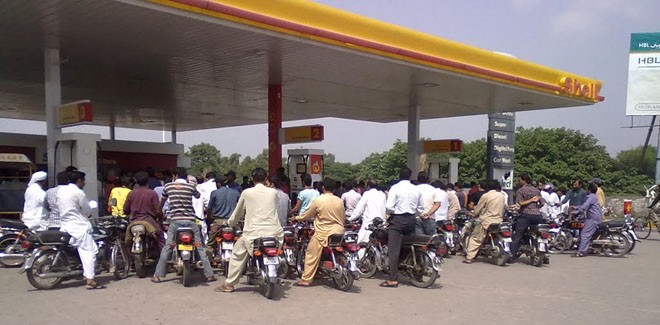

It is sad that the government through higher taxes on petroleum products is reducing fiscal deficit, without realising that price hikes in these items affect economy in general and poor masses in particular and retard growth in all sectors. Our tax system favours the wealthy and collects exorbitant indirect taxes from the poor.
The government, instead of collecting income tax from the rich, imposes heavy taxes on petroleum products -- extending extraordinary benefits to a few powerful oil companies. By plugging loopholes that prevent wealthy companies and individuals from paying a fair share of taxes, the government can generate enough revenues to build public transport system that would save billions that are mercilessly spent on import of crude oil.
Our oil demand is to rise by 7 per cent by the end of June 30, 2014 -- it would touch 21 million tons against 19.5 million tons due to closure of Compressed Natural Gas (CNG) stations and rising circular debt. Over the last eight years, POL products demand rose by an average 4-5 per cent per year.
According to data released by the Oil Companies Advisory Committee (OCAC), Pakistan consumed 8.9 million tons of oil products over July-November, up by 10 per cent from 8.1 million tons in the same period of 2012. If the CNG outlets remain closed for the next four months, we would be forced to import additional petrol worth $2 billion. The production of two-wheelers alone rose to 1.6 million units in 2012-13, from around 250,000 units in 2003-04 -- motorcycle account for about 55 per cent of the countrytotal petrol consumption.
Rising need of petroleum and its heavy taxation leaves the common man stripped of his earnings, and renders the lives of the poor more miserable than before. But despite all these, it brings in super duper profits to the petroleum companies and revenues in trillions for the government (per Rana Bhagwandas Commission Report on Petroleum Prices submitted to Supreme Court of Pakistan in 2009).
It is an incontrovertible fact that the main beneficiaries of price rises are a few oil companies and the Federal Board of Revenue (FBR). The FBR, in its Year Book 2012-13, has admitted that "sales tax is major revenue generating source of federal tax receipts. It constitutes around 44 per cent of the total net revenue collection during the FY 2012-13. The gross and net sales tax collection during the year has been Rs 871 billion and Rs 841.3 billion, respectively, showing a growth of 2.5 per cent and 4.5 per cent respectively over the collection of previous fiscal year. Of net collection, more than half of total sales tax is contributed by sales tax on imports while the rest originates from domestic sales."
The same is the story of "17 per cent growth" in revenue collection of the FBR during the first six months of FY 2013-14, about which Premier Nawaz Sharif and his economic wizard Ishaq Dar are proud of. They are least concerned if high petroleum prices push millions of Pakistanis below the poverty line, destroy the economy and create unrest in the society. The share of government taxes and levies in petroleum prices is more than half from the stage of importation to final ex-refinery supply point -- reference report submitted to Supreme Court by Rana Bhagwandas Commission dated 10 July 2009 revealing that from 2002 to 2009, the government made Rs10.23 trillion in taxes on petroleum products.
It is shameful that during 64 years we have failed to provide mass transit facility for at least 2 large cities -- Karachi and Lahore -- and bus service for every city and town despite burdening the citizens with all kinds of taxes. On the contrary, consumer loans were vastly disbursed under Musharraf-Shaukat era inducing massive purchase of personal vehicles resulting in enormous profits both for the petroleum companies and car manufacturers.
Public transport has been the least priority of all regimes because of which the real sufferer is the common man who cannot afford personal transport. More and more cars on the roads cause pollution, traffic mayhem and are the main source of increase in our oil import bill. In fiscal year 2012-13, Pakistan imported oil worth $14.914 billion -- $9.525 billion on petroleum products and $5.392 billion on import of petroleum crude. Petroleum import constituted more than one-third of the country’s total imports of $44.95 billion during the period under review. In order to cut import bill, we need decent public transport system that can solve all the prevalent problems. The challenge before us is to build good public transport system and a clean energy economy.
If the government collects just Rs200 billion extra from the ultra super rich, it can reduce prices of petrol and diesel by Rs25-30 resulting in major relief for the masses, bringing down prices of the essential commodities along with substantial reduction in the cost of electricity.